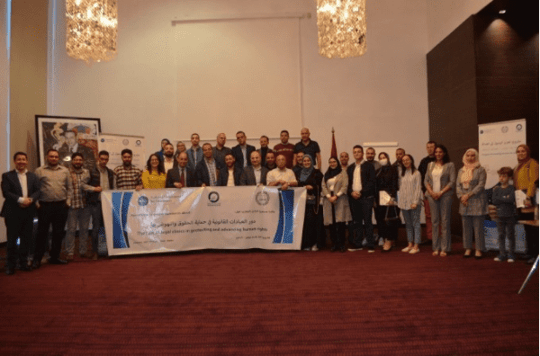Legal Aid Clinics and their Role in the Protection of Human Rights

As part of its mission to connect with other legal clinics in Morocco, the Legal Aid Clinic (CFJD), housed at the Faculty of Social, Legal, and Economic Sciences at the University Sidi Mohamed Ben Abdellah in Fes had the pleasure of participating in a round table event on Saturday, June 5 in Nador. This event was organized by the Annual Forum for Development and Citizenship, the Laboratory of Legal and Political Studies of Mediterranean Countries, and the National Endowment for Democracy (NED). The central theme of this event was the role of legal clinics in the protection and advancement of human rights. The round table was moderated by a panel of law professors, representatives of various legal clinics in Morocco, and active members of civil society.
Several topics were discussed, including the possibilities for the promotion of legal clinics, the concept of legal clinics, the tools of their work, and the contribution of legal clinics in strengthening the culture of human rights. Also, an exchange of experiences between the different clinics took place, including the legal clinic of the Multidisciplinary Faculty of Nador, the Legal Clinic of Rabat, and the Hijra Legal Clinic in Oujda.
This event was an opportunity for the CJFD to present its experience in its areas of intervention, mainly migration, human trafficking, and family mediation. In addition to the promising results obtained so far, the representatives of CJFD, Professor Said El Bakkouri, CJFD Director, and Basma Okbi, HAF Program Training Manager, presented an overview of the training program that has taken place for the benefit of the clinicians. It was also an opportunity to present the events arranged by the CJFD such as the visit of Mr. David Green, Chargé d’Affaires of the United States Embassy in Morocco, and other members of the American diplomatic corps.
Finally, such an event is strongly welcomed by CJFD because it actively contributes to the strengthening of legal clinics in Morocco through instructive debates and fruitful exchanges of different experiences and showcases the importance and role of legal clinics in the protection and strengthening of human rights.
Legal Aid Clinics are an essential part of the protection of human rights. By providing legal information, “bottom-up justice” may be advanced, where vulnerable persons such as migrants, youth, women, and those living in poverty or fear, may be empowered, protected, and supported in the realization of their rights. Indeed, projects such as CJFD are successful through the support of governments. In the case of Morocco, it has implemented several policies to guide the work of organizations such as CJFD. Articles 31-33 of the Marrakech Compact for Migration are an example of this:
We commit to ensuring that all migrants…can exercise their human rights through safe access to basic services…to foster inclusive and cohesive societies by empowering migrants to become active members of society and promoting the reciprocal engagement of receiving communities and migrants in the exercise of their rights and obligations towards each other, including observance of national laws and respect for [local] customs…to strengthen the welfare of all members of society by minimizing disparities…and increasing public confidence in policies related to migration, in line with the acknowledgment that fully integrated migrants are better positioned to contribute to prosperity… to eliminate all forms of discrimination… [and] to promote… public discourse on migration and migrants… that generates a more realistic, human, and constructive perception.
The CJFD is a foundation for fostering intercultural, societal, and economic dialogue essential for perpetuating a harmonious future of coexistence for Morocco’s growing diversity. It has the potential to serve as a model by which Moroccan academia and civil society can grow to play a crucial role in the increased inclusion of migrants and displaced persons, thereby contributing to the sustainable and democratic development of the country.
The High Atlas Foundation is working in partnership with the Faculty of Economic and Social Legal Sciences (FSJES) at the University Sidi Mohamed Ben Abdellah (USMBA) in Fes to operate and grow a Law Clinic and Legal Aid program that actively engages students in experiential and service learning for the benefit of marginalized communities in the Fes-Meknes region. The project is funded by the National Endowment for Democracy (NED) and the U.S.-Middle East Partnership Initiative (MEPI).